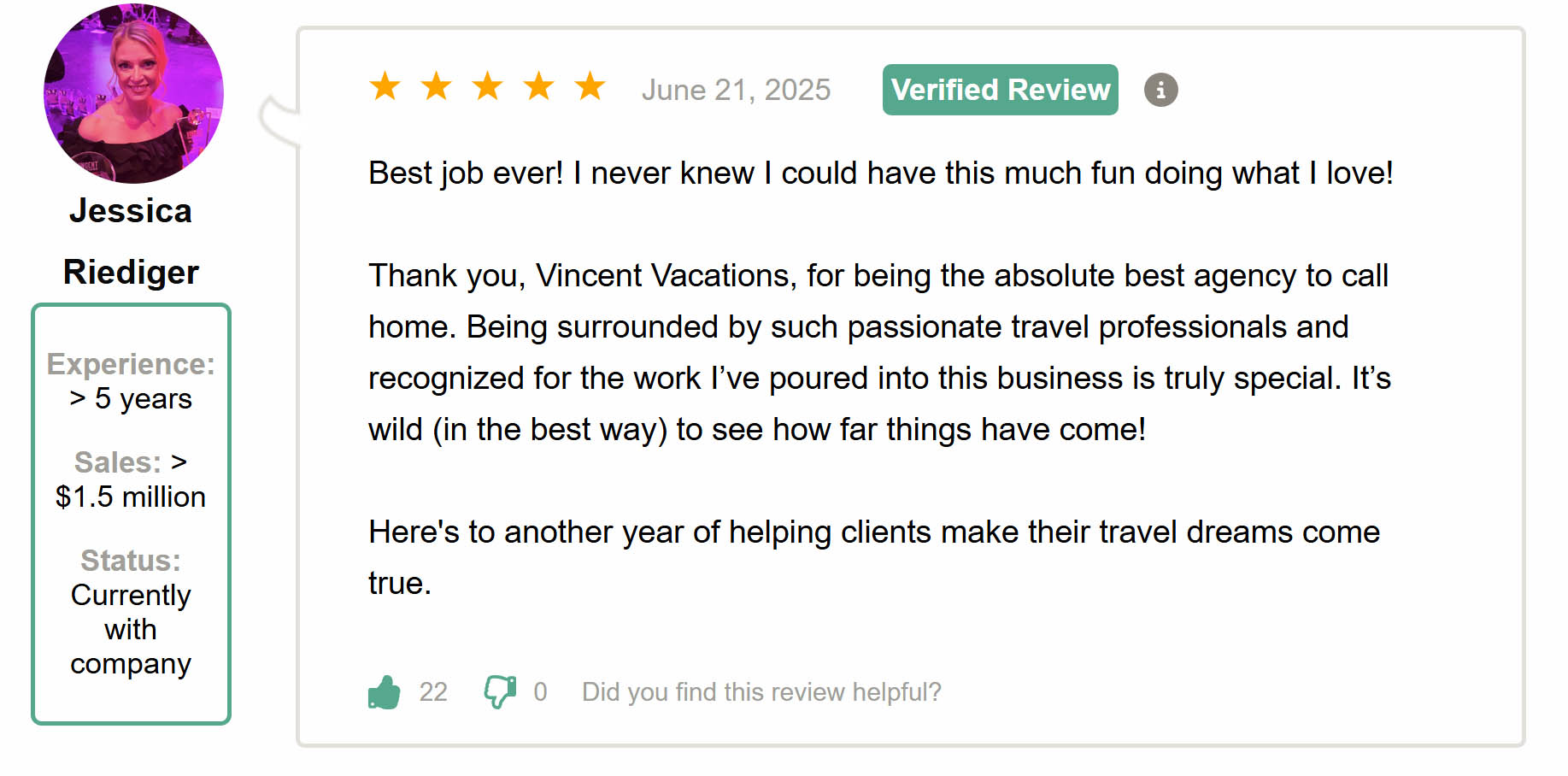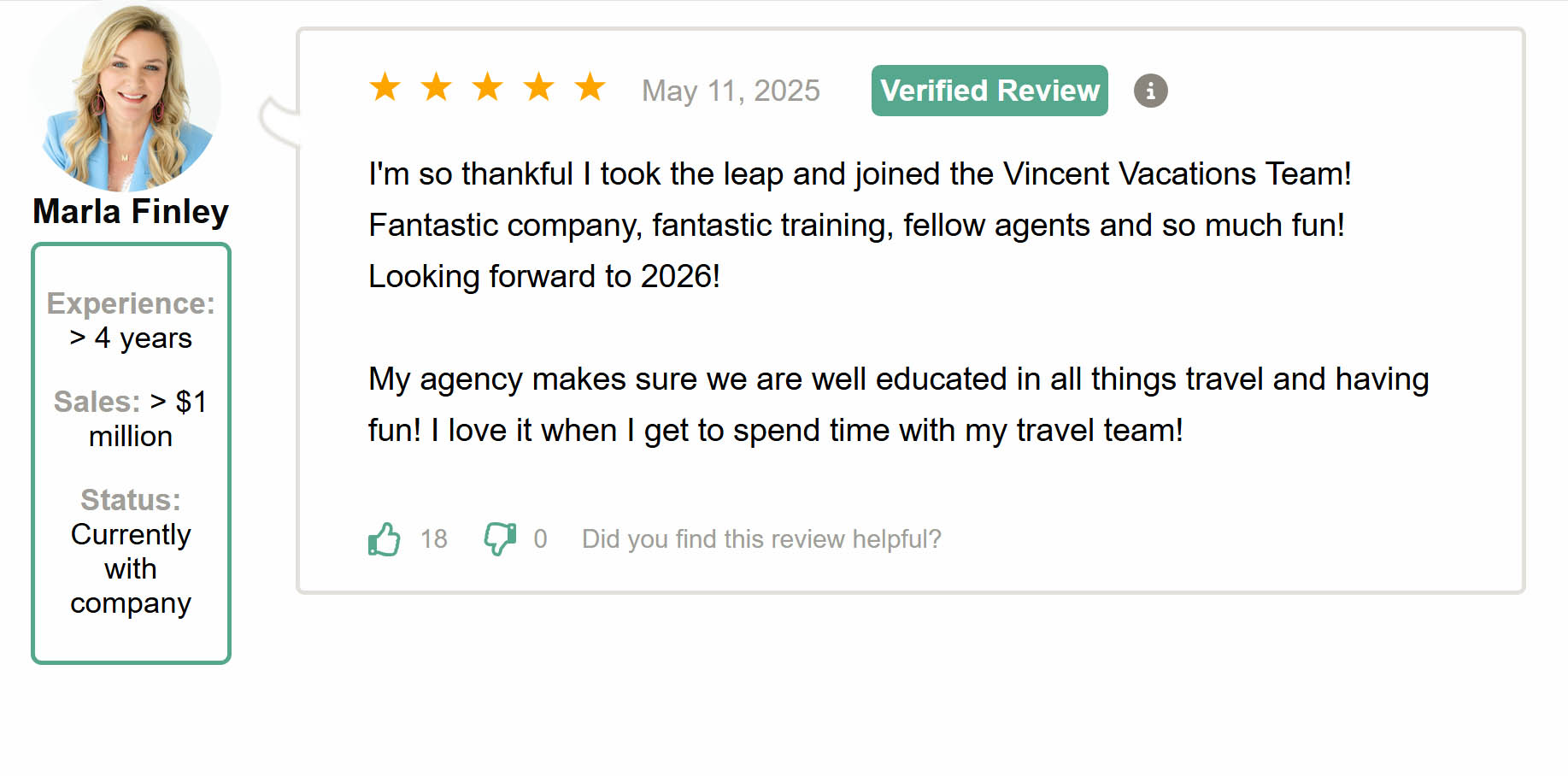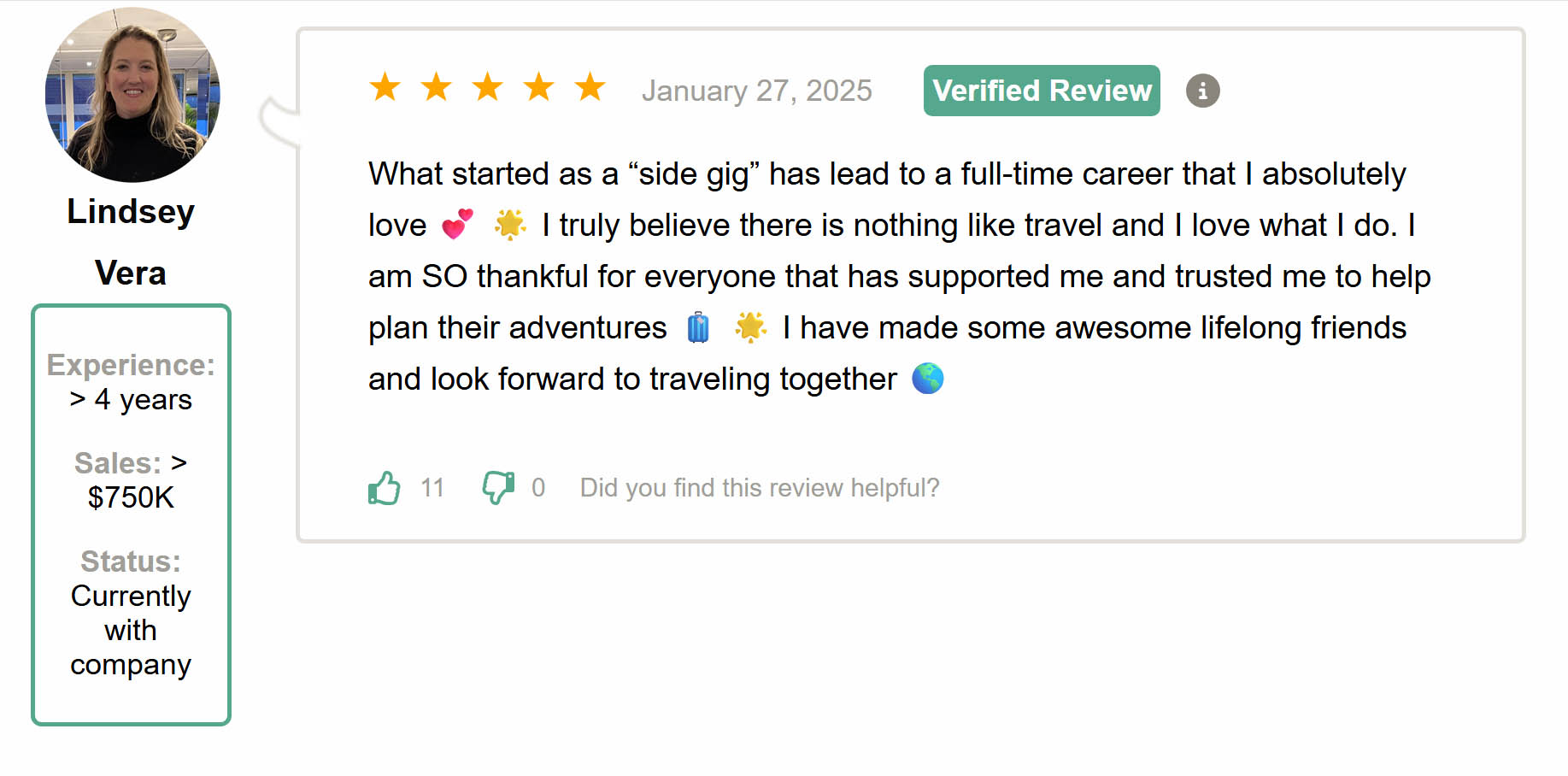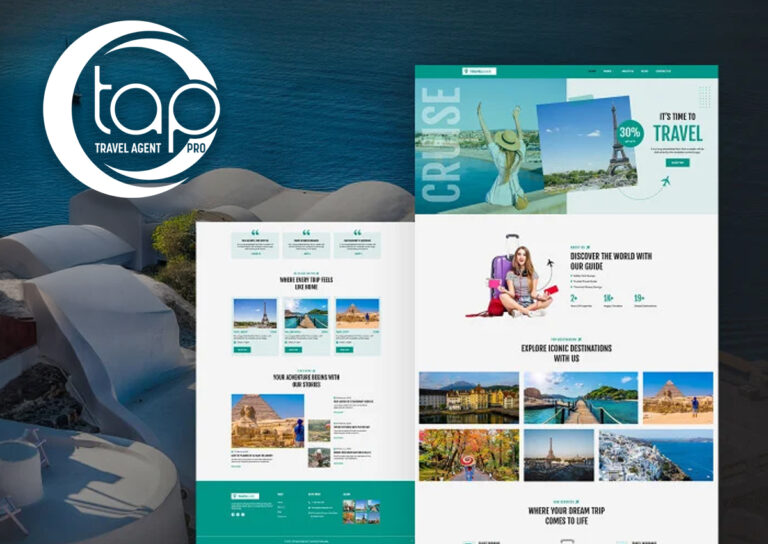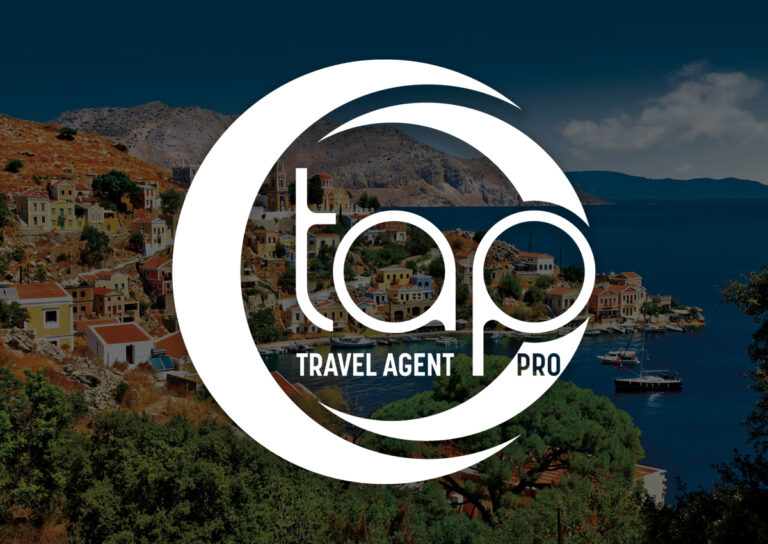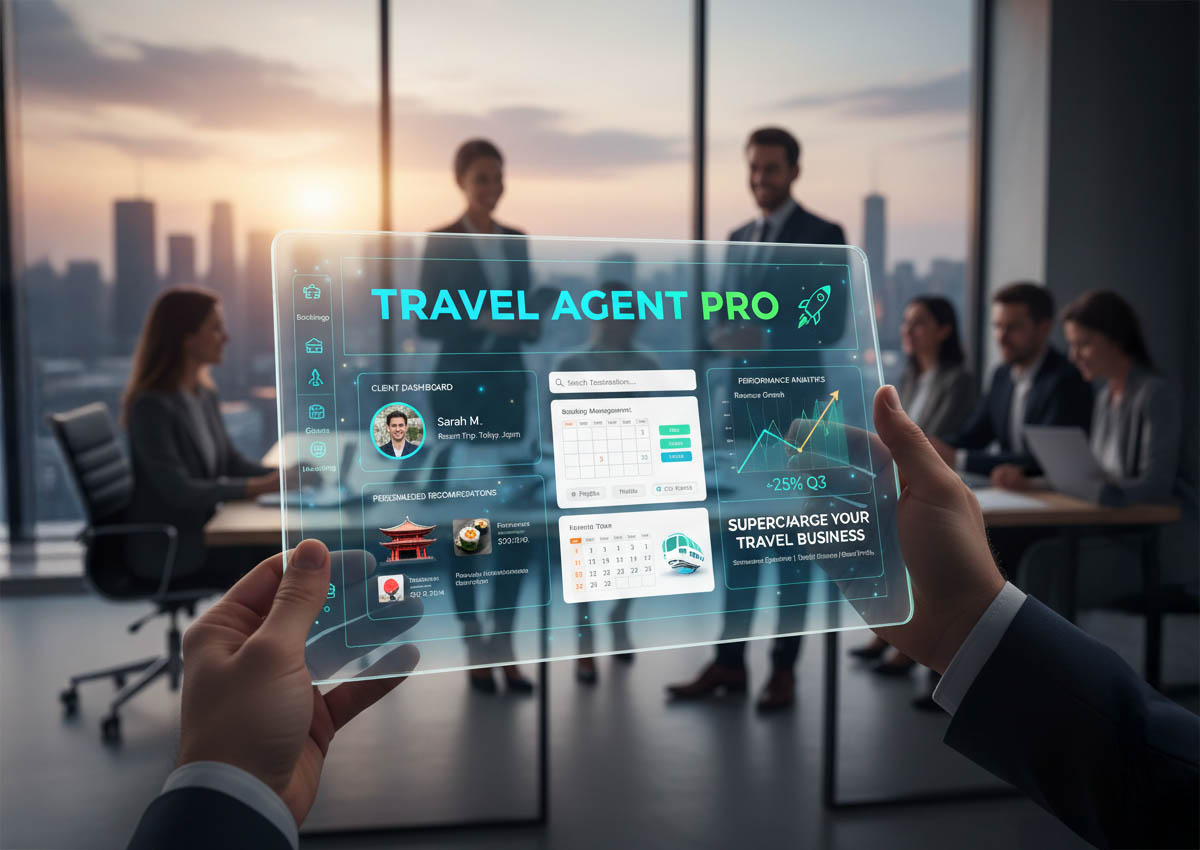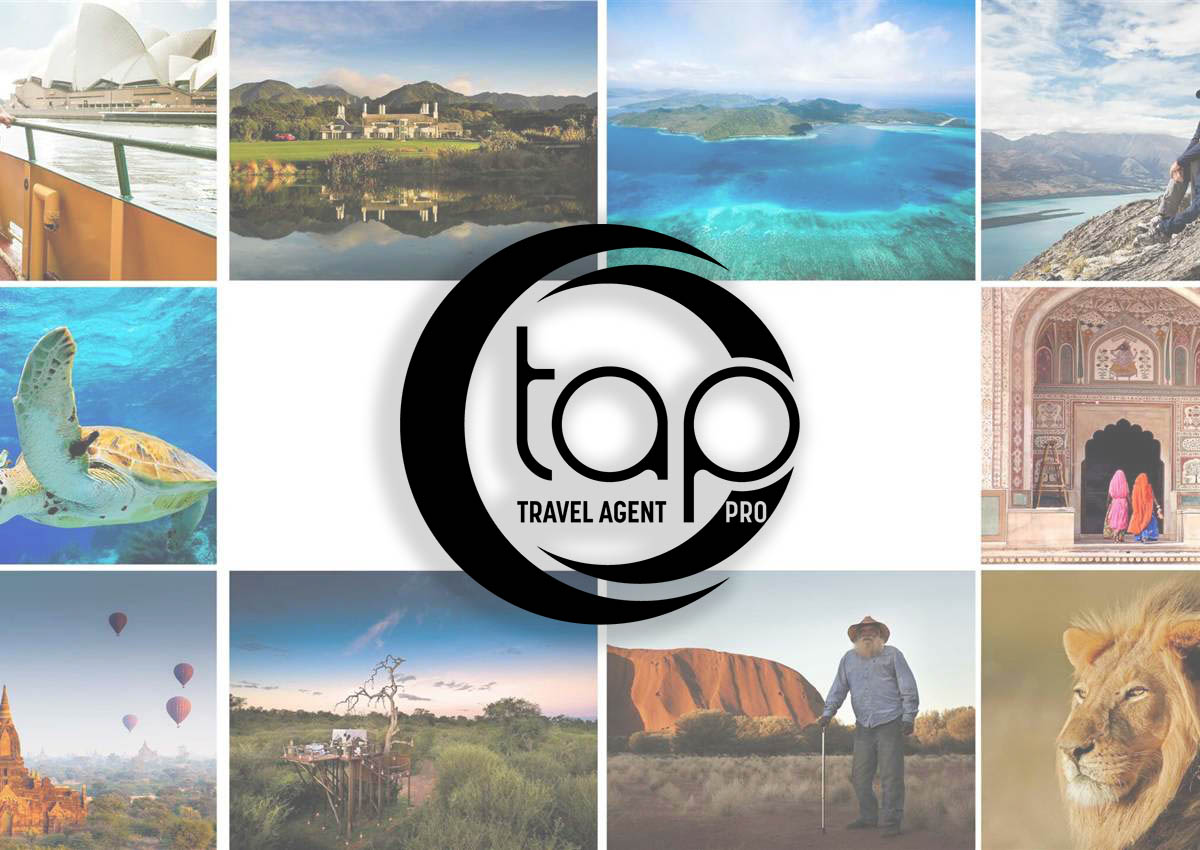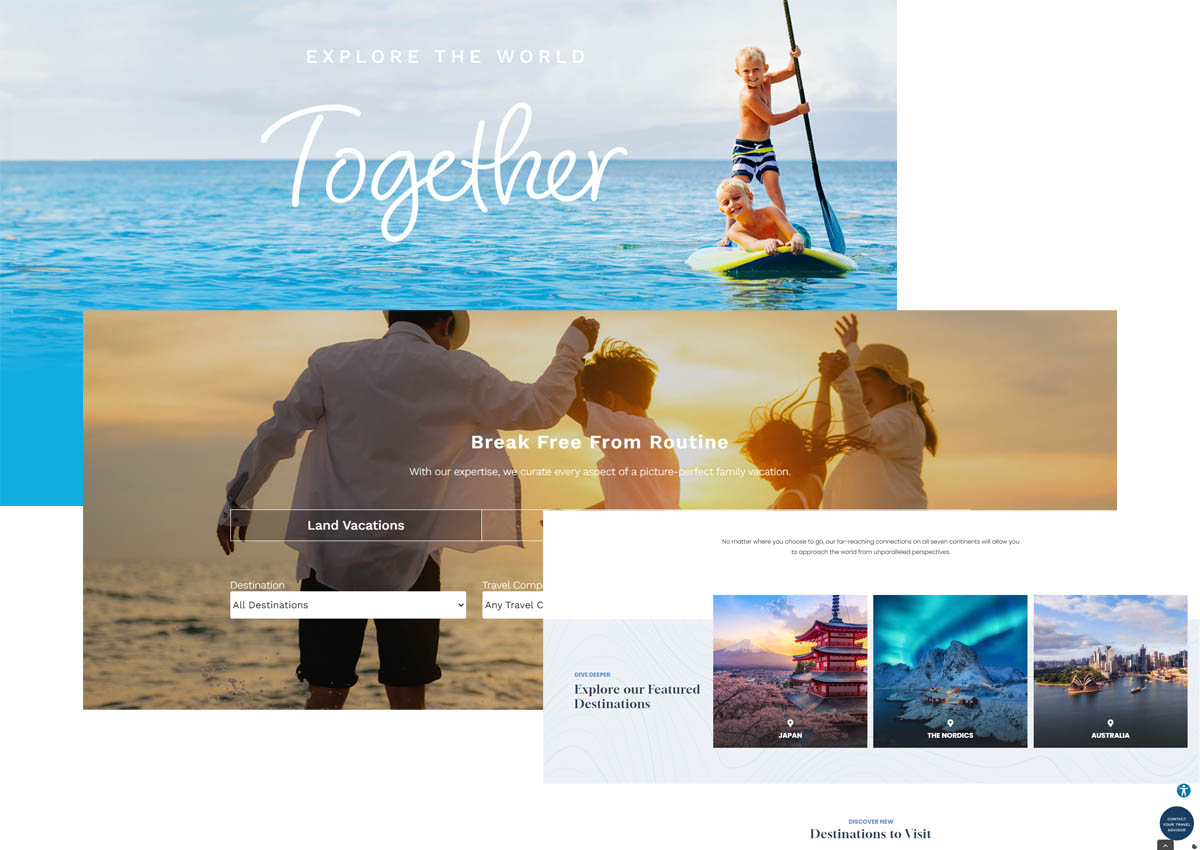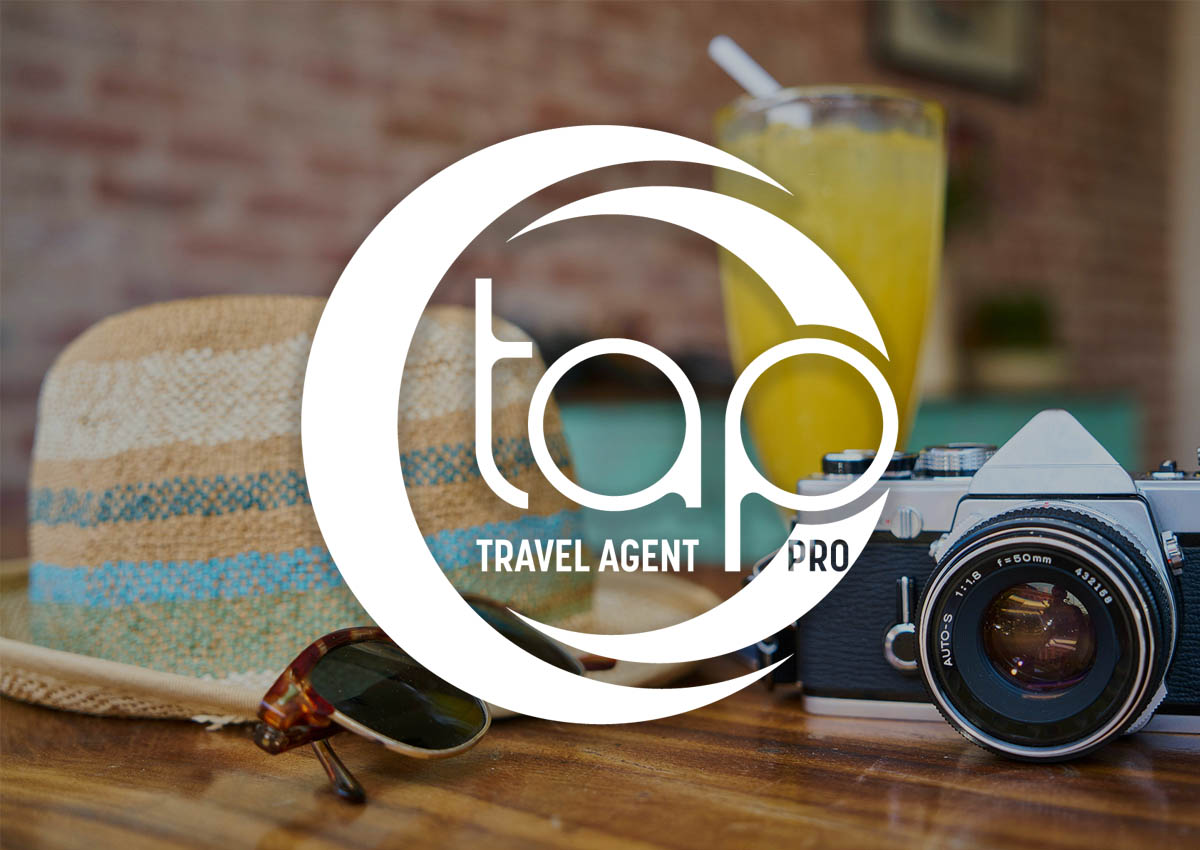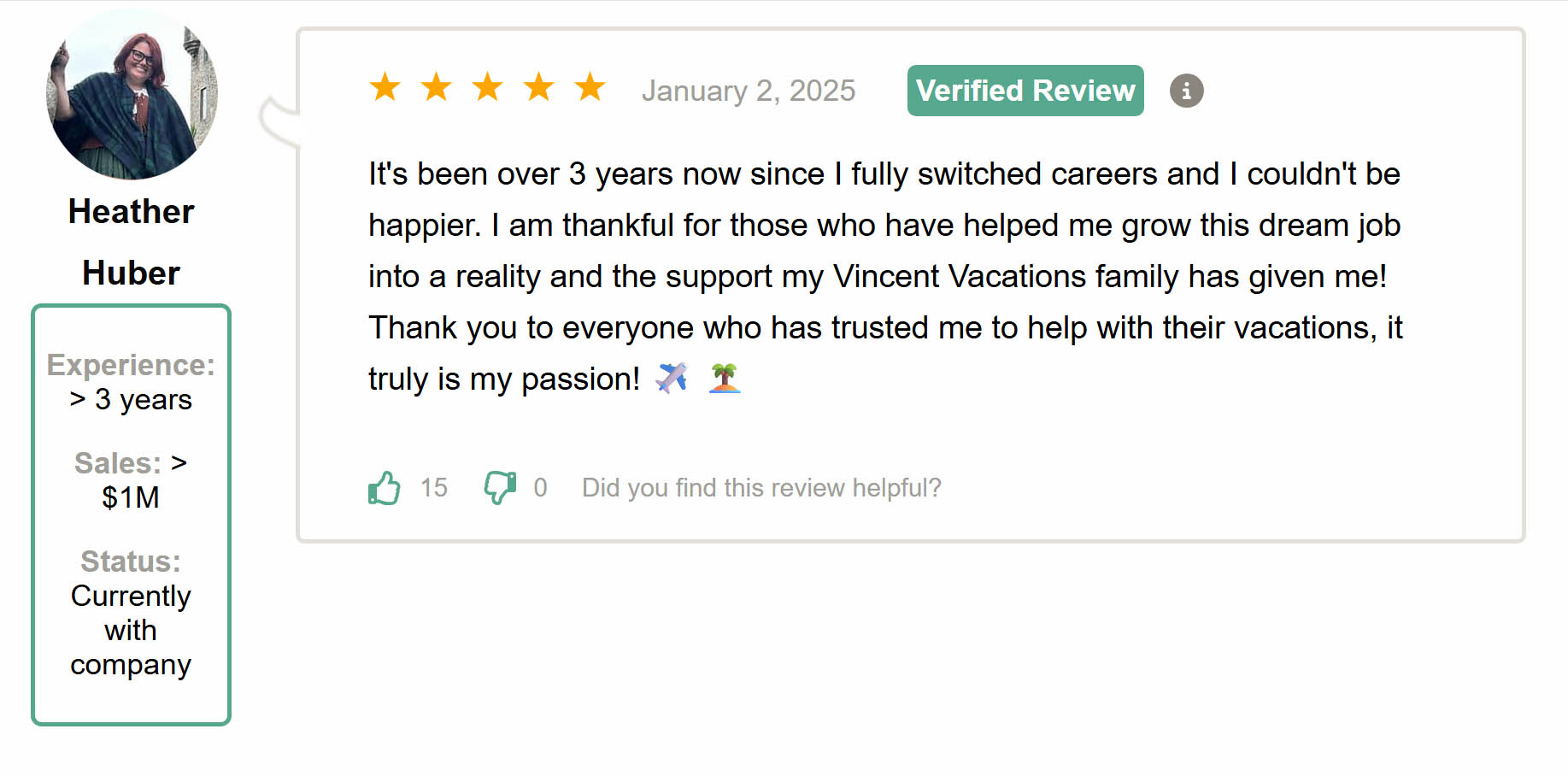Category :
Marketing & Social MediaThe Top 9 Marketing Trends of 2025 for Travel Businesses
To learn more techniques and how to create and grow your own travel business, sign-up to become a member today!

The travel industry is evolving at an unprecedented pace, and staying ahead of the curve requires a keen understanding of the latest marketing trends.
In 2025, several key strategies will dominate the travel marketing landscape, each offering unique opportunities to engage, convert, and retain customers.
As the travel industry continues to evolve at a rapid pace, staying ahead of the curve requires a deep understanding and adoption of the latest marketing trends. The year 2025 promises to be a transformative time, with several key trends set to dominate the landscape.
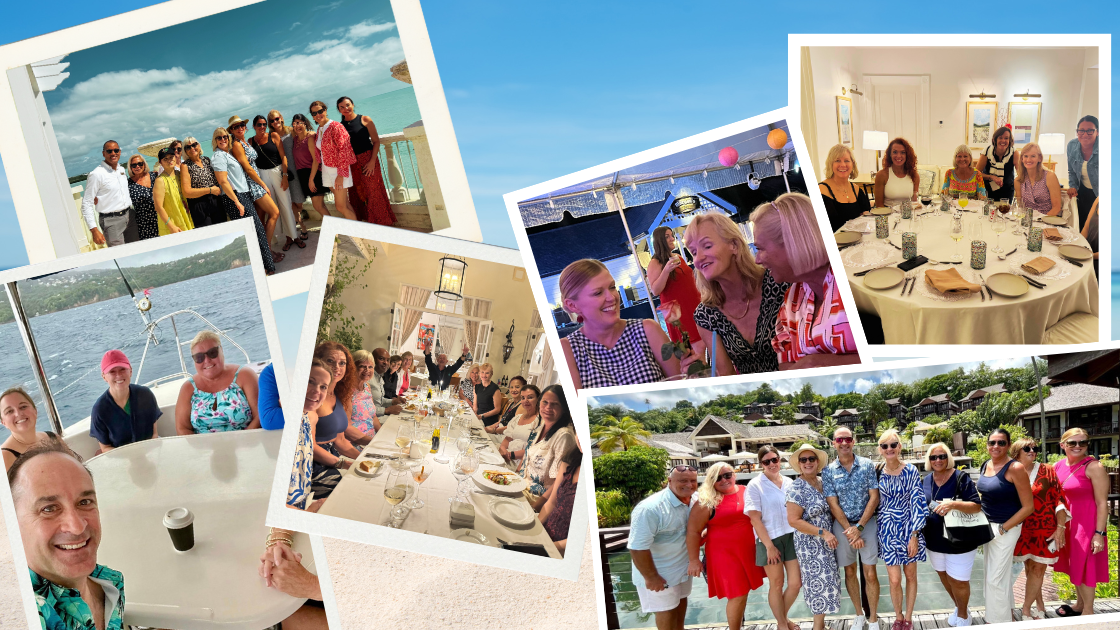
Ready to Elevate Your Travel Business?
Join Vincent Vacations, the host agency designed to help you succeed. Discover why top agents choose us:
- Membership plans offering up to 100% commission.
- Proud member of the prestigious Signature Travel Network.
- Direct access to top tier preferred suppliers.
- Ongoing education, exclusive FAM trips, and much more.

Smart Personal Branding to Attract Dream Clients
Defining Your Unique Value Proposition (UVP)
In the competitive travel industry, defining your Unique Value Proposition (UVP) is crucial for standing out and attracting your dream clients. Your UVP should be authentic and aligned with your personal brand, reflecting who you are as a travel entrepreneur and what sets you apart from others. It’s essential to understand your audience and tailor your UVP to resonate with their needs and desires.
"Your UVP should be a clear and compelling statement that explains why clients should choose you over others."
Creating a Consistent Brand Voice and Aesthetic
A consistent brand voice and aesthetic is vital for building a strong personal brand. This involves injecting your personality and values into every aspect of your branding, from your website to your social media profiles. Ensure that your brand voice is consistent across all platforms, reflecting your unique identity and values. This consistency helps in building trust and recognition with your audience.
| Elements of Consistent Branding | Description |
|---|---|
| Brand Voice | The tone and language used in all your communications. |
| Visual Identity | The logos, colors, and imagery that represent your brand. |
| Content Style | The format and style of the content you create and share. |
Your Host Travel Agency
Launched by industry veterans, Vincent Vacations is working to carve out a niche as a boutique, community-driven option designed by advisors, for advisors.
Learn MoreEngaging with Your Audience Through Personal Stories
Engaging with your audience through personal stories is a powerful way to build a connection and attract dream clients. People buy from people they know, like, and trust, so sharing your personal experiences and stories can humanize your brand and make it more relatable. Use your stories to showcase your expertise, passions, and values, and ensure they align with the interests and needs of your target audience.
Example of a Personal Story:
"I specialize in adventure travel because I've always been passionate about extreme sports and exploring off-the-beaten-path destinations. My personal experiences have taught me what makes a trip truly unforgettable, and I love sharing that with my clients."
By mirroring the actions and interests of your ideal clients, as suggested by Dale Carnegie's mirroring technique, you can create a deeper connection and build trust. This approach helps in making your brand more appealing and relatable to your target audience.
"People connect with businesses that have a distinct identity and a human touch."

Social Media as the Top Search Engine for Travelers
Optimizing Your Social Media Profiles for Search
In today's digital landscape, social media profiles have become essential for travelers searching for travel inspiration and information.
To capitalize on this trend, it is crucial to optimize your social media profiles for search. This involves using relevant keywords in your profile descriptions, ensuring your profiles are complete and up-to-date, and utilizing geo-tagging to make your content more discoverable.
"Optimizing your social media profiles for search helps potential customers find you when they are actively looking for travel ideas and information."
| Optimization Tips | Description |
|---|---|
| Use Relevant Keywords | Incorporate keywords related to travel and your specific services in your profile descriptions. |
| Complete and Up-to-Date Profiles | Ensure all fields are filled out and keep your profiles updated with fresh content. |
| Geo-Tagging | Use location tags to make your content more discoverable by travelers searching for specific destinations. |
Using Instagram and TikTok for Travel Marketing
Instagram and TikTok are powerful platforms for travel marketing, offering a visually engaging way to showcase destinations and experiences. On Instagram, use high-quality images and videos, and leverage features like Instagram Stories and Reels to share real-time content. On TikTok, create short, engaging videos that highlight the unique aspects of your travel offerings.
Example of Instagram Content:
"A stunning photo of a beach resort with a caption like 'Escape to paradise with our exclusive packages!'"
Both platforms allow you to engage with your audience through comments, hashtags, and direct messages, making them ideal for building a community of potential travelers.
"Visual content on Instagram and TikTok can inspire and engage travelers, driving interest and bookings."
Leveraging Influencer Marketing on Social Platforms
Influencer marketing on social media platforms is a highly effective way to reach a broader audience and build credibility. Partner with travel influencers who have a following that aligns with your target market. These influencers can share their personal experiences with your travel services, providing authentic endorsements that can significantly influence potential travelers' decisions.
| Benefits of Influencer Marketing | Description |
|---|---|
| Authentic Endorsements | Influencers share real experiences, adding credibility to your brand. |
| Broad Reach | Influencers have large followings, allowing you to reach a wider audience. |
| Engagement | Influencer content often generates high engagement rates, such as likes, comments, and shares. |
By leveraging these social media strategies, travel businesses can effectively engage with travelers, build their brand presence, and drive bookings in a highly competitive market.

Authenticity in Marketing: Building Trust in an AI-Driven World
In the fast-evolving travel industry, authenticity is more crucial than ever for building trust with potential customers. As AI becomes increasingly integrated into marketing strategies, maintaining transparency and genuine communication is vital.
The Importance of Transparency in Travel Marketing
Transparency is the backbone of authentic marketing. Travel businesses must be open and honest in their communications to foster trust. This involves clearly outlining what customers can expect from their travel experience, including any potential challenges or limitations. By being transparent, you can establish a strong foundation for your brand's reputation and build long-term relationships with your customers.
"Transparency breeds trust, and trust is the foundation of any successful relationship."
Using User-Generated Content to Enhance Authenticity
User-generated content (UGC) is a powerful tool for enhancing authenticity in travel marketing. By showcasing real experiences and stories from actual travelers, you can create a sense of relatability and trust. UGC can include photos, videos, and reviews from customers, which can be shared across social media platforms and your website. This approach not only adds a personal touch but also provides social proof that can influence potential customers' decisions.
| Benefits of User-Generated Content | Description |
|---|---|
| Increases Trust | Real experiences from customers build credibility. |
| Enhances Relatability | Customers can see themselves in the stories of others. |
| Improves Engagement | UGC encourages interaction and sharing on social media. |
Leveraging Customer Testimonials and Reviews
Customer testimonials and reviews are another essential component of authentic marketing. These testimonials provide firsthand accounts of the travel experience, offering potential customers valuable insights into what they can expect. By highlighting positive reviews and testimonials on your website and marketing materials, you can demonstrate your commitment to customer satisfaction and build trust with your audience.
Example of a Customer Testimonial:
"Our trip to the beach resort was absolutely amazing The staff were friendly, the rooms were clean, and the activities were fun. We can't wait to go back!"
By incorporating these elements—transparency, user-generated content, and customer testimonials—into your marketing strategy, you can create an authentic and trustworthy brand image that resonates with your audience in an AI-driven world.
Become a Travel Agent: Unleash Your Full Potential
Ready for a career that's as fulfilling as it is rewarding? Becoming a travel agent with Vincent Vacations means building a business around your passion for travel.

The Power of Micro-Conversions in Travel Marketing
Understanding Navigation-Based Micro Conversions
In travel marketing, navigation-based micro conversions are critical as they indicate how users are navigating through your website. These micro conversions include actions such as visiting specific pages, like the homepage, about page, or product/service pages. For instance, if a user lands on the homepage of a travel website and then navigates to the "Destinations" or "Packages" page, it shows their interest in exploring what you offer. This data can be used to optimize the user journey, ensuring that the most relevant information is easily accessible and that the path to conversion is streamlined.
"Tracking navigation-based micro conversions helps you understand the user's journey and identify potential bottlenecks."
Engagement-Based Micro Conversions: Videos, Downloads, and More
Engagement-based micro conversions are actions that show users are actively engaging with your content. This includes watching videos, downloading brochures or eBooks, or even sharing content on social media. For example, if a user watches a video showcasing a travel destination or downloads a travel guide, it indicates a higher level of interest and engagement. These micro conversions are valuable because they help you understand what content resonates with your audience and can guide future content creation and marketing strategies.
| Examples of Engagement-Based Micro Conversions | Description |
|---|---|
| Watching a Video | Users spend time consuming video content, indicating strong engagement. |
| Downloading Content | Users find your resources valuable enough to download, such as travel guides or eBooks. |
| Sharing Content on Social Media | Users share your content, indicating they find it valuable and worth recommending. |
Your Host Travel Agency
Launched by industry veterans, Vincent Vacations is working to carve out a niche as a boutique, community-driven option designed by advisors, for advisors.
Learn MoreInteraction-Based Micro Conversions: Live Chats and Forms
Interaction-based micro conversions involve direct interactions between the user and your website or customer service. This includes filling out forms, participating in live chats, or signing up for newsletters. For instance, if a user engages in a live chat to inquire about a travel package or fills out a form to request more information, it shows a high level of interest and intent. These micro conversions are crucial as they often precede the final conversion action and can provide valuable insights into user behavior and preferences.
Example of an Interaction-Based Micro Conversion:
"A user fills out a contact form to ask about customized travel packages. This interaction provides an opportunity to engage with the user directly and address their specific needs."
"Interaction-based micro conversions offer a direct line to understanding user intent and improving the overall customer experience."
By tracking and analyzing these different types of micro conversions, travel businesses can gain a deeper understanding of their customers' behaviors and preferences, ultimately leading to more effective marketing strategies and higher conversion rates.

Delivering Exceptional Customer Experiences
Personalized Marketing and Customer Segmentation
To deliver exceptional customer experiences, personalized marketing is essential. This involves segmenting your customer base to understand their unique needs, preferences, and behaviors. By using data and analytics, you can create highly targeted marketing campaigns that resonate with each segment of your audience. For instance, if you have a segment of customers who frequently book luxury travel packages, you can tailor your marketing messages to highlight exclusive amenities and services that would appeal to them.
"Personalization is about treating individuals as individuals, not just as part of a larger group."
| Benefits of Personalized Marketing | Description |
|---|---|
| Increased Engagement | Customers are more likely to engage with content that is relevant to them. |
| Improved Conversion Rates | Personalized messages can lead to higher conversion rates as they address specific customer needs. |
| Enhanced Customer Satisfaction | Personalization shows that you understand and care about your customers' individual preferences. |
Enhancing User Experience Through Website Optimization
A well-optimized website is crucial for delivering exceptional customer experiences. This involves ensuring that your website is user-friendly, fast, and easy to navigate. Website optimization includes improving page load times, simplifying the checkout process, and making sure that the site is mobile-friendly. According to Google, 53% of mobile users abandon sites that take longer than three seconds to load, so optimizing for speed is vital.
Example of Website Optimization:
Optimizing images and using caching to reduce page load times.
Additionally, using tools like heatmaps and user session recordings can help you understand how users interact with your website, allowing you to make data-driven improvements to enhance the user experience.
Building Loyalty Programs and Reward Schemes
Loyalty programs and reward schemes are powerful tools for turning customers into loyal fans. These programs incentivize repeat business by offering rewards, discounts, or exclusive benefits to loyal customers. For example, a travel company could offer points for every booking made, which can be redeemed for future trips or upgrades. This approach not only encourages repeat business but also fosters a sense of loyalty and appreciation among your customers.
"Loyalty programs build a long-term relationship with your customers, making them more likely to choose your brand over others."
| Elements of Effective Loyalty Programs | Description |
|---|---|
| Points or Rewards System | Customers earn points or rewards for their purchases or interactions. |
| Exclusive Benefits | Offering exclusive discounts, early access, or special perks to loyal customers. |
| Personalized Communication | Regularly updating loyal customers with personalized offers and updates. |
By implementing these strategies, you can create a customer experience that is not only exceptional but also memorable and rewarding, leading to long-term customer loyalty.

Sustainable Travel and Eco-Friendly Marketing
Highlighting Eco-Friendly Travel Options and Initiatives
In the increasingly eco-conscious travel landscape, highlighting eco-friendly travel options and initiatives is crucial for attracting environmentally aware travelers. This involves showcasing the sustainable practices and green initiatives of your travel business. For example, if your company offers eco-friendly accommodations, sustainable transportation options, or supports local conservation projects, make sure to prominently feature these aspects in your marketing materials.
"Travelers are more likely to choose destinations and travel providers that prioritize sustainability and environmental responsibility."
| Examples of Eco-Friendly Initiatives | Description |
|---|---|
| Eco-Friendly Accommodations | Highlight hotels or resorts that use renewable energy, reduce waste, and implement sustainable practices. |
| Sustainable Transportation | Offer transportation options that are environmentally friendly, such as electric or hybrid vehicles. |
| Local Conservation Projects | Support and promote local projects that focus on conservation and environmental protection. |
Partnering with Sustainable Travel Providers
Partnering with sustainable travel providers can enhance your brand's commitment to sustainability and appeal to eco-conscious travelers. Collaborate with suppliers who share your values and have a proven track record of sustainable practices. This could include working with tour operators who use eco-friendly equipment, partnering with local businesses that support community development, or choosing airlines that have robust sustainability policies.
Example of Partnership:
"Partnering with a local tour operator who uses solar-powered boats for water tours."
By aligning with sustainable providers, you can ensure that every aspect of the travel experience, from start to finish, is environmentally responsible.
"Partnerships with sustainable providers not only enhance your brand's reputation but also contribute to a more sustainable travel industry."
Communicating Your Brand's Commitment to Sustainability
Communicating your brand's commitment to sustainability is essential for building trust and credibility with eco-conscious travelers. Clearly articulate your sustainability policies and initiatives through all your marketing channels, including your website, social media, and customer communications. Use transparent and honest language to explain how your business is working towards sustainability goals.
| Ways to Communicate Sustainability | Description |
|---|---|
| Website Content | Dedicate a section of your website to sustainability, outlining your policies and initiatives. |
| Social Media | Regularly post updates and stories about your sustainability efforts on social media platforms. |
| Customer Communications | Include information about your sustainability commitment in newsletters, emails, and other customer communications. |
"Transparent communication about your sustainability efforts helps build trust and loyalty with your customers."
By highlighting eco-friendly options, partnering with sustainable providers, and clearly communicating your commitment to sustainability, you can attract and retain customers who value environmental responsibility.
For Both Aspiring and Experienced Travel Advisors
Build a travel business doing what you love - on your own terms. Start booking trips the day you join, with a best-in-class education curriculum developed by industry experts.

The Role of Artificial Intelligence in Travel Marketing
Using AI for Personalized Travel Recommendations
In the realm of travel marketing, artificial intelligence (AI) plays a significant role in enhancing the customer experience through personalized travel recommendations. AI algorithms can analyze vast amounts of data, including user behavior, preferences, and past travel history, to suggest tailored travel options. For instance, if a traveler has previously booked beach vacations, AI can recommend similar destinations or packages that align with their interests.
"Personalized recommendations make travelers feel understood and valued, increasing the likelihood of booking."
| Benefits of Personalized Recommendations | Description |
|---|---|
| Increased Relevance | Recommendations are based on the traveler's specific preferences and history. |
| Enhanced User Experience | Travelers are more likely to engage with content that is relevant to them. |
| Higher Conversion Rates | Personalized recommendations can lead to higher conversion rates as they address specific customer needs. |
AI-Driven Chatbots for Customer Service
AI-driven chatbots are revolutionizing customer service in the travel industry. These chatbots can handle a wide range of customer inquiries, from booking and cancellation to providing travel tips and destination information. By automating routine tasks, chatbots free up human customer service agents to focus on more complex and personalized support.
Example of Chatbot Interaction:
"Hello How can I assist you with your travel plans today?"
Chatbots are available 24/7, ensuring that customers receive immediate assistance whenever they need it, which can significantly improve customer satisfaction.
"AI-driven chatbots provide round-the-clock support, enhancing the overall customer service experience."
Predictive Analytics for Forecasting Travel Trends
Predictive analytics, powered by AI, is a powerful tool for forecasting travel trends. By analyzing historical data, market trends, and external factors like weather and economic conditions, predictive analytics can help travel businesses anticipate demand and adjust their strategies accordingly. This includes optimizing pricing, managing inventory, and planning marketing campaigns to align with forecasted trends.
| Benefits of Predictive Analytics | Description |
|---|---|
| Data-Driven Decisions | Make informed decisions based on accurate forecasts of travel trends. |
| Optimized Operations | Adjust pricing, inventory, and marketing strategies to match anticipated demand. |
| Competitive Advantage | Stay ahead of competitors by anticipating and responding to market trends before they happen. |
Your Host Travel Agency
Launched by industry veterans, Vincent Vacations is working to carve out a niche as a boutique, community-driven option designed by advisors, for advisors.
Learn More"Predictive analytics helps travel businesses stay ahead of the curve, ensuring they are always prepared for what's next."
By integrating these AI-driven strategies into your marketing approach, you can enhance customer experiences, improve operational efficiency, and drive business growth in the competitive travel industry.

Virtual and Augmented Reality in Travel Marketing
Creating Immersive Travel Experiences with VR/AR
Virtual and Augmented Reality (VR/AR) are revolutionizing the travel industry by allowing potential travelers to experience destinations in a highly immersive and interactive way. VR/AR technologies enable travel businesses to create virtual experiences that simulate the sights, sounds, and even feelings of being in a particular location. This can include virtual tours of hotels, resorts, or attractions, giving travelers a real sense of what to expect before they book.
"Immersive VR/AR experiences can significantly influence travel decisions by providing a realistic preview of the destination."
| Benefits of VR/AR Experiences | Description |
|---|---|
| Increased Engagement | Travelers are more likely to engage with content that is interactive and immersive. |
| Improved Decision Making | VR/AR experiences help travelers make more informed decisions about their travel plans. |
| Enhanced Customer Satisfaction | Travelers feel more satisfied when they have a clear understanding of what to expect from their trip. |
Using VR/AR for Virtual Tours and Pre-Travel Previews
Virtual tours and pre-travel previews are another powerful application of VR/AR in travel marketing. These virtual tours allow potential travelers to explore destinations, hotels, and attractions in detail before booking. For instance, a traveler considering a stay at a luxury resort can take a virtual tour of the rooms, amenities, and surrounding area, helping them make a more informed decision.
Example of Virtual Tour:
"A 360-degree virtual tour of a beachfront resort, allowing travelers to explore the property and its amenities."
This approach not only enhances the customer experience but also reduces the likelihood of disappointment or misunderstandings about the destination.
"Virtual tours provide a realistic and engaging way for travelers to preview their travel options."
Enhancing Customer Engagement with Interactive Content
Interactive content powered by VR/AR can significantly enhance customer engagement in travel marketing. This includes interactive videos, 3D models, and augmented reality experiences that allow travelers to interact with the content in a meaningful way. For example, an AR app could allow travelers to see how a hotel room would look with different decor or how a destination would appear at different times of day.
| Examples of Interactive Content | Description |
|---|---|
| Interactive Videos | Videos that allow viewers to choose what to explore next or interact with the scene. |
| 3D Models | Three-dimensional models of destinations or accommodations that can be explored in detail. |
| Augmented Reality Experiences | Experiences that overlay digital information onto the real world, such as showing what a hotel room would look like with different decor. |
"Interactive VR/AR content engages travelers on a deeper level, making the travel planning process more enjoyable and informative."
By incorporating VR/AR into your marketing strategy, you can create a more engaging, informative, and immersive experience for potential travelers, ultimately driving more bookings and enhancing customer satisfaction.

Mobile-First Marketing Strategies for Travel Businesses
Optimizing Your Website for Mobile Users
In today's digital age, optimizing your website for mobile users is no longer a luxury, but a necessity. With the majority of travelers using their mobile devices to research and book travel, a mobile-friendly website is crucial for providing a seamless user experience. Ensure that your website is responsive, meaning it adapts to different screen sizes and devices, and that the loading times are fast to prevent user frustration.
"A mobile-friendly website is essential for capturing the growing number of mobile users and providing them with a smooth browsing experience."
| Key Elements of Mobile Optimization | Description |
|---|---|
| Responsive Design | The website should adapt to different screen sizes and devices. |
| Fast Loading Times | Ensure that pages load quickly to avoid user dropout. |
| User-Friendly Navigation | Make it easy for users to find what they need with intuitive navigation. |
Developing Mobile Apps for Travel Booking and Services
Developing mobile apps can take your travel business to the next level by providing a dedicated platform for travelers to book and manage their trips. Mobile apps offer a more personalized and convenient experience compared to websites, allowing users to access features like push notifications, offline access, and streamlined booking processes.
Example of Mobile App Features:
"A travel app that allows users to book flights, hotels, and activities, with features like itinerary management and real-time updates."
By offering exclusive app-only deals and loyalty programs, you can incentivize users to download and use your app, increasing customer engagement and loyalty.
"Mobile apps provide a personalized and convenient way for travelers to manage their trips, enhancing the overall travel experience."
Using Mobile-Specific Marketing Channels Like SMS and Push Notifications
Mobile-specific marketing channels, such as SMS and push notifications, are highly effective for engaging with travelers on their mobile devices. These channels allow you to send targeted and timely messages directly to users, whether it's to remind them of an upcoming trip, offer special promotions, or provide important travel updates.
| Benefits of Mobile-Specific Channels | Description |
|---|---|
| High Engagement Rates | SMS and push notifications have higher open rates compared to email marketing. |
| Timely Messaging | Send messages at the right moment to maximize impact and relevance. |
| Personalization | Customize messages based on user behavior and preferences for better engagement. |
"SMS and push notifications are powerful tools for engaging with travelers in real-time, driving higher engagement and conversion rates."
By adopting these mobile-first marketing strategies, travel businesses can better serve their mobile-savvy audience, enhance user experience, and ultimately drive more bookings and customer loyalty.
From Passion to Profit
Vincent Vacations provides unparalleled benefits to both new and experienced travel agents. We empower you to deliver exceptional value to your clients and elevate your career.

Data-Driven Marketing: Leveraging Analytics for Better Decision Making
Collecting and Analyzing Customer Data Effectively
In the era of data-driven marketing, collecting and analyzing customer data is paramount for making informed decisions. This involves gathering data from various sources such as website interactions, social media, customer feedback, and purchase history. By analyzing this data, you can gain valuable insights into customer behavior, preferences, and pain points. Tools like CRM systems and analytics software can help you organize and interpret this data effectively.
"Data analysis is the key to understanding your customers' needs and behaviors, enabling you to tailor your marketing efforts accordingly."
| Types of Customer Data | Description |
|---|---|
| Website Interactions | Data on how users navigate and engage with your website. |
| Social Media Interactions | Engagement metrics from social media platforms. |
| Customer Feedback | Reviews, surveys, and other forms of customer feedback. |
| Purchase History | Records of past purchases and transactional data. |
Using Analytics Tools for Performance Tracking and Optimization
Analytics tools are essential for tracking the performance of your marketing efforts and optimizing them for better results. These tools provide real-time data on metrics such as website traffic, conversion rates, and social media engagement. By regularly monitoring these metrics, you can identify areas that need improvement and make data-driven decisions to optimize your campaigns.
Example of Analytics Tool:
"Using Google Analytics to track website traffic and conversion rates."
Analytics tools also help in A/B testing different marketing strategies, allowing you to compare the performance of various approaches and choose the most effective ones.
"Analytics tools empower you to make data-driven decisions, ensuring that your marketing efforts are always optimized for maximum impact."
Creating Data-Driven Marketing Campaigns and Strategies
Data-driven marketing campaigns and strategies are designed to maximize effectiveness by leveraging the insights gained from customer data and analytics. By segmenting your customer base based on their behaviors and preferences, you can create highly targeted marketing campaigns that resonate with each segment. For instance, if data shows that a particular demographic is more likely to engage with email marketing, you can tailor your email campaigns to better appeal to this group.
| Benefits of Data-Driven Campaigns | Description |
|---|---|
| Higher Engagement Rates | Campaigns are more likely to engage the target audience when they are tailored to their preferences. |
| Improved Conversion Rates | Data-driven campaigns can lead to higher conversion rates as they address specific customer needs. |
| Enhanced Customer Satisfaction | Personalized campaigns show that you understand and care about your customers' individual preferences. |
"Data-driven marketing campaigns ensure that your efforts are targeted, effective, and aligned with customer needs."
By integrating these data-driven approaches into your marketing strategy, you can enhance the precision and impact of your marketing efforts, driving better results and customer satisfaction in the travel industry.

Conclusion: Embracing the Future of Travel Marketing
As the travel industry continues to evolve at a rapid pace, staying ahead of the curve requires a deep understanding and adoption of the latest marketing trends. The year 2025 promises to be a transformative time, with several key trends set to dominate the landscape.
Authenticity remains a cornerstone, especially in an AI-driven world where trust is built through transparency and genuine communication. By leveraging user-generated content, customer testimonials, and reviews, travel businesses can establish a strong foundation for their brand's reputation.
"Authenticity is the heartbeat of any successful marketing strategy, fostering trust and loyalty with your audience."
Smart personal branding is another crucial aspect, allowing travel businesses to stand out and attract their dream clients. Defining a unique value proposition, creating a consistent brand voice and aesthetic, and engaging with the audience through personal stories are all essential components of this strategy.
| Key Marketing Trends | Description |
|---|---|
| Smart Personal Branding | Stand out with a unique value proposition and consistent brand voice. |
| Micro-Conversions | Small actions leading to big results through navigation, engagement, and interaction. |
| Exceptional Customer Experiences | Deliver great experiences to turn clients into loyal fans through personalization and optimization. |
Your Host Travel Agency
Launched by industry veterans, Vincent Vacations is working to carve out a niche as a boutique, community-driven option designed by advisors, for advisors.
Learn MoreMicro-conversions, whether navigation-based, engagement-based, or interaction-based, can lead to significant results by guiding potential customers through the sales funnel. By understanding and optimizing these micro-conversions, travel businesses can enhance user engagement and conversion rates.
Delivering exceptional customer experiences is vital for turning clients into loyal fans. This involves personalized marketing, user experience optimization, and building loyalty programs. By segmenting the customer base and tailoring marketing messages, travel businesses can enhance customer satisfaction and encourage repeat business.
Social media has become the top search engine for travelers, making it imperative to optimize social media profiles for search, leverage platforms like Instagram and TikTok, and collaborate with influencers to reach a broader audience.
"Social media is no longer just a platform for engagement; it's a critical search engine for travel inspiration and information."
In addition to these trends, sustainable travel and eco-friendly marketing, virtual and augmented reality, and mobile-first marketing strategies are also gaining traction. These approaches not only appeal to the growing number of eco-conscious and tech-savvy travelers but also enhance the overall travel experience.
Data-driven marketing is another powerful trend, enabling travel businesses to make informed decisions by collecting and analyzing customer data. This approach helps in creating personalized marketing campaigns, optimizing performance, and maximizing return on investment.
| Benefits of Data-Driven Marketing | Description |
|---|---|
| Personalized Campaigns | Targeted campaigns based on customer preferences and behaviors. |
| Performance Optimization | Regular analysis and adjustment of marketing strategies for better results. |
| Maximized ROI | Efficient budget allocation and reduced waste through data-driven insights. |
"Data-driven marketing is the key to unlocking smarter decisions, better-targeted campaigns, and more bookings in the travel industry."
By embracing these trends and integrating them into your marketing strategy, you can stay ahead of the competition, enhance customer satisfaction, and drive business growth in the ever-evolving travel industry.
Learn more about this by signing up as a member, today! Vincent Vacations Application Form.
To learn more techniques and how to grow your travel business, read more on our Articles page.



